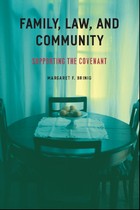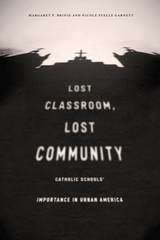
In the wake of vast social and economic changes, the nuclear family has lost its dominance, both as an ideal and in practice. Some welcome this shift, while others see civilization itself in peril—but few move beyond ideology to develop a nuanced understanding of how families function in society. In this provocative book, Margaret F. Brinig draws on research from a variety of disciplines to offer a distinctive study of family dynamics and social policy.
Concentrating on legal reform, Brinig examines a range of subjects, including cohabitation, custody, grandparent visitation, and domestic violence. She concludes that conventional legal reforms and the social programs they engender ignore social capital: the trust and support given to families by a community. Traditional families generate much more social capital than nontraditional ones, Brinig concludes, which leads to clear rewards for the children. Firmly grounded in empirical research, Family, Law, and Community argues that family policy can only be effective if it is guided by an understanding of the importance of social capital and the advantages held by families that accrue it.

This book is the first systematic account of the law and economics of the family. It explores the implications of economics for family law—divorce, adoption, breach of promise, surrogacy, prenuptial agreements, custody arrangements—and its limitations.
Before a family forms, prospective partners engage in a kind of market activity that involves searching and bargaining, for which the economic analysis of contract law provides useful insights. Once a couple marries, the individuals become a family and their decisions have important consequences for other parties, especially children. As a result, the state and community have vital interests in the family.
Although it may be rational to breach a contract, pay damages, and recontract when a better deal comes along, this practice, if applied to family relationships, would make family life impossible—as would the regular toting up of balances between the partners. So the book introduces the idea of covenant to consider the role of love, trust, and fidelity, concepts about which economic analysis and contract law have little to offer, but feminist thought has a great deal to add. Although families do break up, children of divorce are still bound to their parents and to each other in powerful ways.

More than just educational institutions, Catholic schools promote the development of social capital—the social networks and mutual trust that form the foundation of safe and cohesive communities. Drawing on data from the Project on Human Development in Chicago Neighborhoods and crime reports collected at the police beat or census tract level in Chicago, Philadelphia, and Los Angeles, Margaret F. Brinig and Nicole Stelle Garnett demonstrate that the loss of Catholic schools triggers disorder, crime, and an overall decline in community cohesiveness, and suggest that new charter schools fail to fill the gaps left behind.
This book shows that the closing of Catholic schools harms the very communities they were created to bring together and serve, and it will have vital implications for both education and policing policy debates.
READERS
Browse our collection.
PUBLISHERS
See BiblioVault's publisher services.
STUDENT SERVICES
Files for college accessibility offices.
UChicago Accessibility Resources
home | accessibility | search | about | contact us
BiblioVault ® 2001 - 2024
The University of Chicago Press









